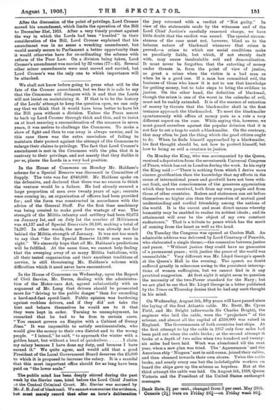The public mind has been deeply stirred during the past
week by the Sievier cane, tried before the Lord Chief Justice at the Central Criminal Court. Mr. Sievier was accused by Mr. J. B. Joel of blackmail We cannot summarise the evidence, but must aisrely record that after an hour's deliberation
the jury returned with a verdict of "Not guilty." In view of. the statements made by the witnesses and of the Lord Chief Justice's carefully reasoned charge, we have little doubt that the verdict was sound. The special circum- stances of the case must not, however, blind us to the heinous nature of blackmail whenever that crime is proved,—a crime to which our social conditions make us peculiarly liable, but which, if not sternly dealt with, may cause incalculable evil and demoralisation. It must never be forgotten that the extorting of money under threats is, from the point of view of justice, as great a crime when the victim is a bad man as when he is a good one. If a man has committed evil, the business of those who know it is not to use that knowledge for getting money, but to take steps to bring the evildoer to justice. On the other band, the definition of blackmail, though the crime is one of the worst in the calendar of evil, must not be rashly extended. It is of the essence of extortion of money by threats that the blackmailer shall in the first instance approach the blackmailed. To meet the blackmailer spontaneously with offers of money puts as a rule a very different aspect on the case. While saying this, however, we must guard ourselves against the popular delusion that it is not fair to set a trap to catch a blackmailer. On the contrary, that may often be just the thing which the good citizen ought to do. When he finds himself approached by a blackmailer, his first thought should be, not how to protect himself, but how to bring so evil a creature to justice.


































 Previous page
Previous page